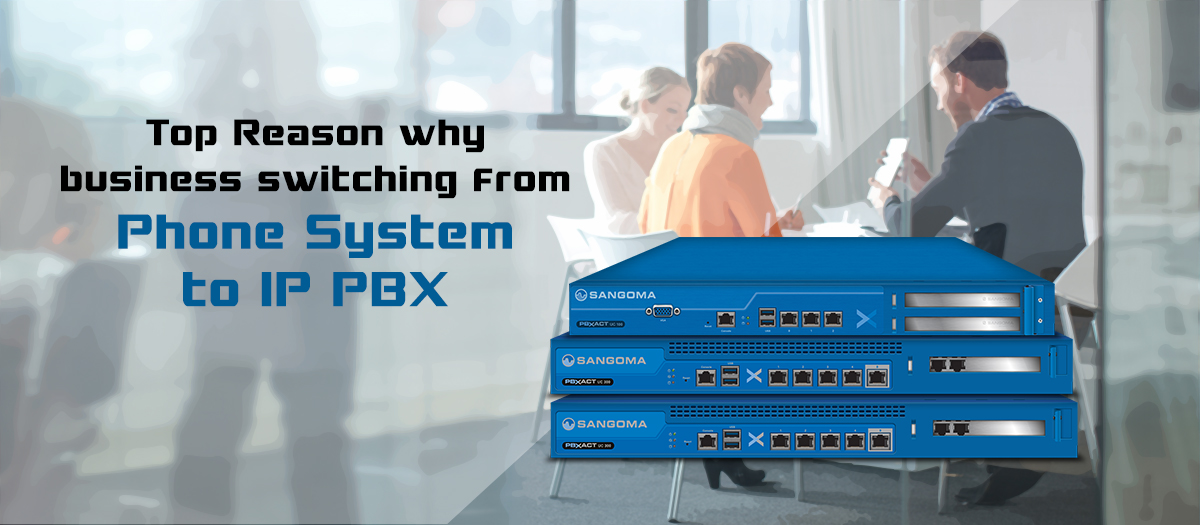Top reason why business switching from phone system to IP PBX
Businesses always try to keep on upgrading to stay competitive in the market. They always tend to adopt all the possible sources that can give them a maximum benefit for successful growth in the future. Today, most of the businesses are running depending on the communication system. For them, the more successful the communication is the more future return they can expect from the business and vice versa. Thus, their primary aim is to make the communication process as much smoother as possible. IP PBX system thus would be the best choice for those business hubs. Here in this blog, we will discuss how this system will prove as the most valuable asset for your organization and how it can give you the best future result to them.
What is IP PBX System?
An IP PBX or private branch exchange (telephone switching system within an enterprise) is a system that provides telephone calls over IP networks. It switches calls between VoIP users on local lines and allows its users to share a certain number of external phone lines. It can also switch calls between a VoIP user and a traditional telephone or landline user, or between two traditional telephone users just like a conventional PBX does. It can come in various abbreviative texts, such as IP-PBX, IP/PBX, or IPPBX.
There are a number of IP-PBX among which some are hardware-based devices, some other are software-based servers. It is your decision to choose which one will be best-suited with your business requirements. In our suggestion, mini sever SIP as it is a professional PBX for Windows, Linux, etc. (the operating systems that are most commonly used by the organizations)
How an IP PBX works
You might have heard that many companies combine a couple of lines to enhance their communication system. This is done only through the PBX system. It handles the call switching and routing within an organization. IP PBX, on the other hand, is the next generation PBX communication system that can provide you with an advanced level of the communication system and thereby becomes a way more beneficial asset for any organization.
It consists of one or more SIP or VoIP phones and also optionally contains a VoIP gateway. The server that is used by this system is similar to the proxy server.
SIP clients, being either softphones or hardware based phones, register with the IP PBX server, and when they wish to make a call they ask the IP PBX to establish the connection. The IP PBX has a directory of all phones/users and their corresponding SIP address and thus is able to connect an internal call or route an external call via either a VoIP gateway or a VoIP service provider to the desired destination.
Difference between VoIP and IP PBX system
Although both of these systems are beneficial for the overall development of the communication process in an organization, there lie some great differences between them. Some of them are explained as under:
System connection protocol: The core difference between PBX and VoIP is their way of connecting the users. While the former uses standard telephonic lines for connecting people either through incoming or through outgoing, the latter involves fewer complications in the way of transferring the calls. It transfers analog to voice over the internet and thus it requires an active internet connection and a computer along with an IP Phone .
Potentiality of equipments: Another distinction between these two is the availability of potential equipment options. If we talk about the traditional PBX system, it uses either corded or cordless phones or headset or other hands-free applications for its operation. On the other hand, VoIP offers multiple equipment options and one can easily fulfill the required purpose just by connecting the phone to the internet but with proper knowledge and guidance.
User-friendly configuration: When it comes to calling, they also differ a lot from each other in providing its features too. For programming or re-programming VoIP systems, one may need an advanced level of knowledge as without this it can be difficult to manage it directly from a computer. It also offers the users to easily change the interface from any internet condition, either while working on a small scale program such as Skype, or any other large scale enterprise-sized program. On the other hand, for the configuration of the PBX system, it needs very simple and familiar idea about the computer and the network which nowadays everyone possesses. Especially if you are using UC 200 or PBX ACT 2000, you can easily run this proprietary phone system without any hassle.
Concluding remark
Now, from this blog hope you have decided on which communication system you should run your business. It is although very clear choice over VoIP and IP PBX. But it will give additional benefits to your organization if you combine them together as this competitive market wants something extra, something that can keep you in the forefront of the competition, If you are having still any query regarding the same, you can mail us and we will try to resolve them either through our next blogs or by giving you answers on the mail itself.
